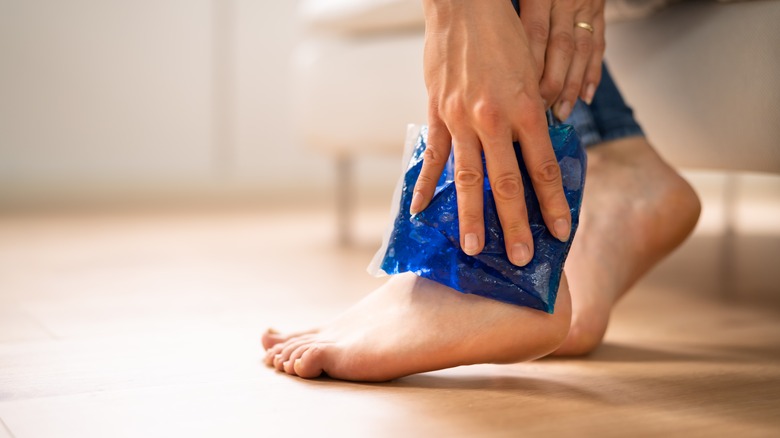Why You Have A Recurring Itch On The Same Part Of Your Body
You've got an itch on your leg that you can't seem to scratch. The more you itch it, the worse the irritation becomes. You might even feel pain in that area, but you can't seem to explain it. Sometimes it goes away for a few days, but it always returns in the same spot.
When you've got an itch that seems to reoccur in the same area or several areas, it's known as chronic pruritus. To qualify for the chronic title, it needs to occur nearly every day for six weeks or longer, according to the Indian Journal of Dermatology. It's not only bothersome, but it can significantly impact a person's daily life, especially if they can't find relief from the itch. These reoccurring itches also make it hard to fall asleep and can lead to further complications from itching.
Scratch your itch for knowledge by discovering why you have a reoccurring itch and the different causes. Get some treatment options and ways that this irritating itch might be prevented.
Types and symptoms of chronic pruritus
Chronic itching can be maddening, especially when you can't find a way to relieve it. Pruritis can happen on any area of the skin. And in addition to itching, it comes with other painful consequences. These might include cracked skin, localized pain, small or large pumps, and discoloration. Additional symptoms beyond the itch might come from the scratching or the underlying cause of the irritation.
Pruritus is a sneaky little condition that can crop up in any area of your body. But a few places are more prone to a chronic itch and come with their own medical terms. According to the American Osteopathic College of Dermatology, brachioradial pruritus is an outer arm itch that can creep into the neck and shoulders, typically due to nerve damage. Another common type of pruritus is pruritus ani, which is itching around the anus. This type of chronic itching could be due to something as minor as sweat. However, it could also be caused by conditions like hemorrhoids, stated Merck Manual. Other common forms are nocturnal pruritus (which itches at night), or uremic pruritus for those with chronic kidney disease.
Itching can pop up anywhere on your body, depending on the cause.
The different causes of pruritus
Knowing what type of itch you have is great because it gets you one step closer to finding the cause and the eventual treatment. The problem is that chronic itching in a particular area of your body can come from many different reasons. It can be a dermatological cause like an allergic reaction or a skin condition like psoriasis. Additionally, a 2021 study in Science Translational Medicine found that chronic itching from inflammatory skin diseases might be due to an immune signaling molecule called oncostatin M, which could lead to new treatment options.
The itch in question isn't always dermatological, though; some systemic diseases beyond the skin can cause you to have a pruritus, like cirrhosis or renal disease, according to MedlinePlus. The Indian Journal of Dermatology also notes that symptoms can come from neurological disorders caused by nerve compression, irritation, or even damage. Chronic itching can even be part of different psychosomatic disorders, making it difficult for specialists to pinpoint precisely what's causing the irritating itch.
Once the cause has been established, then it's time for you to find some relief. There are several different treatment options for making you itch-free — or at least helping you itch less.
Treatment methods to try for recurring itch
When a reoccurring itch has you scratching, the first place you might reach is for the lotion or cream. And that's honestly a great place to start — since skin allergies and dermatological conditions (like eczema) cause most reoccurring itches. Adding a bit of lotion or ointment to your skin will calm the itch and make your skin feel better. It can also be helpful to make sure your environment is cool and moist by adding an air conditioner and humidifier, according to the Official Publication of The College of Family Physicians of Canada.
Sometimes lotion isn't enough, so you might want to move on to over-the-counter (OTC) medications like cortisone and menthol creams. Your healthcare specialist might also prescribe topical or oral medications, like steroids. These are often used to treat dermatologic diseases and systemic conditions, stated WebMD. Since it can be hard not to scratch, behavior therapy and relaxation techniques to avoid scratching are used to treat neuropathic itching and other disorders.
Treatment is a must once the itching has taken hold of your life. But depending on the cause, you might be able to prevent the irritation with a few lifestyle changes.
Ways to prevent the reoccurring itch
Biological causes for a persistent itch will be hard to prevent, so medications and behavioral techniques will be your best bet. However, environmental factors can work to flare up an itch, and they are entirely preventable with the proper precautions. Keeping your skin hydrated through creams and ointments in addition to your medication can be beneficial. The American Academy of Dermatology Association (AAD) also recommends putting on your medications before applying your moisturizer.
Steer clear of hot water, wear loose-fitting clothing that can breathe, like cotton, and consider changing your bedding fabric too. When the itch flares up, rather than scratching it, try applying a cool compress to help soothe it or take an oatmeal bath. The AAD also recommends avoiding drastic weather changes, which can worsen the condition. Stress is also a trigger, so meditation and deep breathing can be helpful.
When a reoccurring itch flares up, it tends to strike in the same spot. This is typically because of some underlying condition or allergy. Getting a diagnosis and treatment from your medical professional is recommended when OTC medications aren't working, or the itch persists.





